Longs Peak is famous for creating
it own weather. In July 2004, several friends and I were climbing
an adjacant mountain, Storm Peak and watched a storm develop entirely
on it's own. It was an incredible demonstration of how on what
was otherwise a perfect day, Long's can surprise you with a wicked
storm complete with rain, hail and lightening
 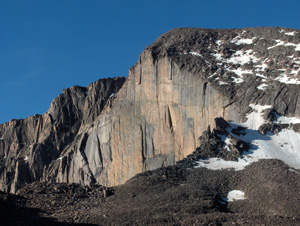 The day started off absolutely perfect.as
we left the trail head about 4:00 AM. We had intended on
climbing the Keiner's route just off the diamond. But for
lack of a rope, we had to abandon our plan and settle for
a pleasant day hike. After some debate we headed towards
Storm Peak, a 13,326 pile of rocks The day started off absolutely perfect.as
we left the trail head about 4:00 AM. We had intended on
climbing the Keiner's route just off the diamond. But for
lack of a rope, we had to abandon our plan and settle for
a pleasant day hike. After some debate we headed towards
Storm Peak, a 13,326 pile of rocks
|
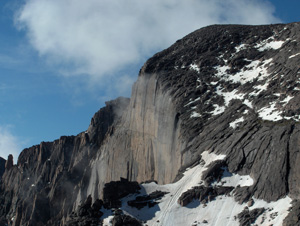 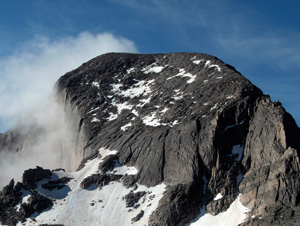 Mild winds
from the east moved higher becoming less dense. This combined
with lower air pressure caused the air to expand. As it expands,
it cools, about 5.5 degrees for every 1000 feet. As the air moved
higher and cooled and reached the "dewpoint", the temperature
at which water vapor in the air becomes saturated, the water molecules
started to condense into water droplets. They became visible as
clouds. Mild winds
from the east moved higher becoming less dense. This combined
with lower air pressure caused the air to expand. As it expands,
it cools, about 5.5 degrees for every 1000 feet. As the air moved
higher and cooled and reached the "dewpoint", the temperature
at which water vapor in the air becomes saturated, the water molecules
started to condense into water droplets. They became visible as
clouds.
|
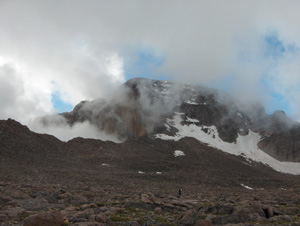 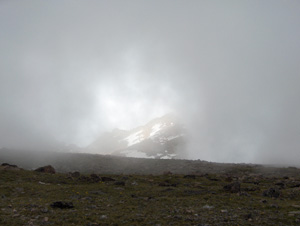 The air continued
to cool as it rose and more water drops formed - or the clouds
got thicker. When they were large enough, they fell to the ground
as rain, sleet, hail or snow. The air continued
to cool as it rose and more water drops formed - or the clouds
got thicker. When they were large enough, they fell to the ground
as rain, sleet, hail or snow.
We had left Storm Peak and were headed down as the rain started
to fall. |
|

